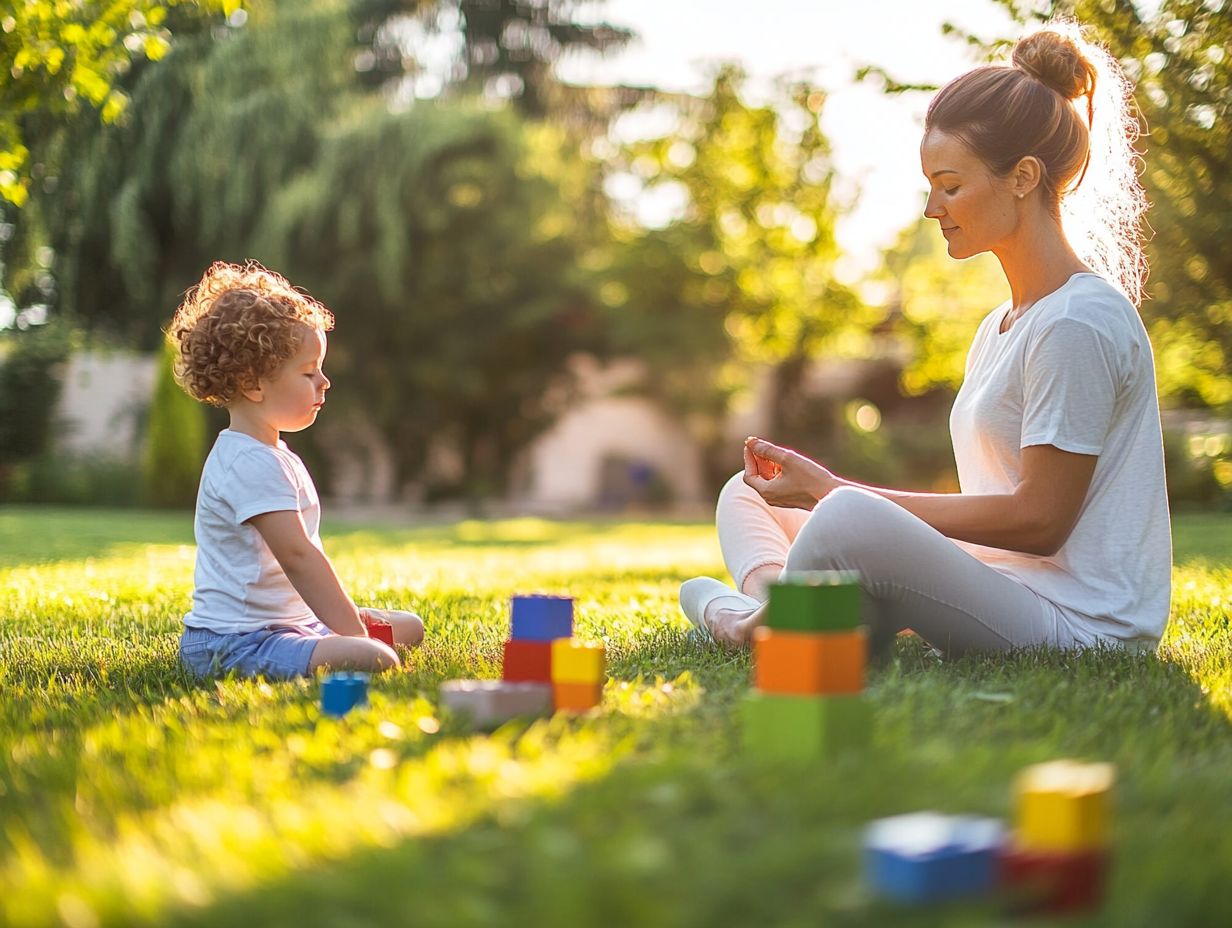What Techniques Promote Mindful Parenting?
In today s fast-paced world, you may often find parenting to be an overwhelming experience. However, mindful parenting provides a refreshing approach that encourages you to be present and fully engaged with your children, promoting better family dynamics and emotional awareness.
This article delves into the essence of mindful parenting and highlights its numerous benefits, including improved parent-child relationships, stress reduction, and enhanced emotional regulation.
You ll also discover practical techniques to weave mindful practices into your daily life and address the common parenting challenges that may arise along the way.
Explore how embracing mindfulness can transform your parenting journey, foster deeper connections with your child, and provide insights into effective parenting strategies.
Contents
- Key Takeaways:
- What is Mindful Parenting?
- The Benefits of Mindful Parenting
- Techniques for Practicing Mindful Parenting
- How to Incorporate Mindful Parenting into Daily Life
- 2. Mindful Parenting in Challenging Situations
- 3. The Importance of Modeling Mindful Behavior
- Challenges and Tips for Practicing Mindful Parenting
- 1. Overcoming Distractions
- Frequently Asked Questions
- Curious About Techniques That Promote Mindful Parenting?
- How Can Practicing Patience Help with Mindful Parenting?
- Why Is Active Listening Important in Mindful Parenting?
- What Role Do Boundaries Play in Mindful Parenting?
- How Does Self-Care Contribute to Mindful Parenting?
- How Can Being Present in the Moment Improve Mindful Parenting?
Key Takeaways:

- Mindful parenting improves parent-child relationships by fostering understanding and connection in the present moment.
- Practicing mindfulness as a parent reduces stress and anxiety, leading to a more peaceful and harmonious household. Techniques such as self-compassion and mindful breathing can enhance this effect.
- Techniques such as mindful breathing, non-judgmental awareness, and self-regulation can be incorporated into daily life to cultivate mindful parenting habits, benefiting both parent and child.
What is Mindful Parenting?
Mindful parenting is all about being intentional in your approach to raising children. It emphasizes awareness, presence, and emotional regulation in everyday interactions.
This practice underscores the significance of caring actions and compassionate parenting, fostering a positive relationship between you and your child through mindfulness techniques and emotional awareness. Mindful parenting also emphasizes the importance of empathy in parenting.
By weaving various parenting styles and mindfulness practices into your daily routine, you can manage stress more effectively. This practice also enhances your communication skills and allows you to tackle parenting challenges with greater ease.
Renowned experts like Dr. Mark Bertin, Dr. Elisha Goldstein, and Dr. Amy Saltzman champion mindful approaches to elevate your parenting effectiveness and meet the emotional needs of your children. Resources like Verywell Mind and insights from Yolanda Renteria also offer valuable perspectives on mindful parenting.
The Benefits of Mindful Parenting
The advantages of mindful parenting are extensive and transformative, significantly elevating the well-being of both you and your children. By embracing mindful practices, you cultivate enriched parent-child relationships and foster a harmonious family environment.
Studies reveal that practicing mindful parenting can significantly lower your stress levels while promoting emotional regulation and resilience in your children. By honing in on mindful responses and enhancing your emotional awareness, you become more skilled at tackling parenting challenges and managing stress.
Start embracing mindful parenting today to unlock a happier, healthier family life.
1. Improved Parent-Child Relationship
An improved parent-child relationship is one of the most significant advantages of embracing mindful parenting, as it cultivates deeper connections through active listening and empathetic communication. When you are fully present during daily interactions, you gain a greater understanding of your child’s emotional needs, creating a nurturing environment where they feel valued and heard. This practice is rooted in awareness in parenting, which emphasizes being attuned to your child’s emotional triggers.
This heightened awareness paves the way for more meaningful exchanges, giving your children the power to express their feelings openly. By actively listening, you send a powerful message that their thoughts and emotions matter, nurturing a sense of security and trust between you.
Incorporating mindfulness into your parenting routine not only enhances emotional regulation for both you and your child but also lays the groundwork for healthier conflict resolution and mutual respect. By modeling these essential skills, you foster empathy. This equips your children with vital communication tools for lasting relationships. Research shows these techniques effectively develop emotional intelligence and social decision-making skills in children.
2. Decreased Stress and Anxiety
Decreased stress and anxiety are significant benefits you ll experience when you embrace mindful parenting practices, empowering you to better navigate the pressures and demands of raising children. By incorporating mindfulness-based relaxation techniques techniques that help you focus on the present moment and relax into your routine, you can cultivate a profound sense of calm and presence, which enhances your ability to respond to parenting challenges without feeling overwhelmed.
These practices not only build your emotional resilience but also serve as a powerful example for your children, teaching them how to cope with stress effectively. For instance, consider integrating short breathing exercises and guided meditations into your daily routine just a few minutes to focus on your breath can dramatically shift your mental state.
Mindful listening during family conversations allows you to stay present and engaged, minimizing misunderstandings that often escalate stress. Establishing a family gratitude practice at dinner significantly enhances your overall sense of well-being. By shifting the focus from daily stresses to moments of appreciation, you contribute to creating a more harmonious home environment. This practice also promotes self-care and compassion within the family unit.
3. Increased Emotional Regulation
Increased emotional regulation is a pivotal advantage of mindful parenting, empowering you to cultivate skills to manage emotions better that enhance your interactions with your children. By practicing mindfulness techniques, you can become more attuned to your emotional triggers, learning to respond thoughtfully rather than reactively, which ultimately shapes healthier parenting behaviors.
For example, when you take a moment to engage in deep-breathing exercises or meditation, you create a valuable pause that allows you to process your feelings before interacting with your child. This practice not only sharpens your emotional awareness but also fosters a calmer home environment, making it easier to address challenging behaviors without escalating tensions. Engaging in self-compassion during these moments can further enhance your ability to manage parenting stress.
Mindful practices such as journaling or guided imagery can further promote emotional clarity, enabling you to reflect on your interactions and refine your responses. As you nurture these self-regulation skills, the benefits ripple through your familial relationships, creating a more supportive and emotionally intelligent atmosphere where your children can truly thrive. Such practices can also be part of a broader behavioral management strategy.
Techniques for Practicing Mindful Parenting

Practicing mindful parenting means embracing a range of techniques designed to foster emotional awareness and elevate the quality of your daily interactions with your children. Techniques like mindful breathing, compassionate listening, and self-regulation can significantly enhance the bond you share. This enables you to stay present and fully engaged during your moments together.
By weaving these mindful practices into your daily routines, you can navigate behavioral challenges with greater ease. You ll also be better equipped to nurture your children s emotional needs. This approach is supported by psychological research and insights from experts like Rachael Green.
1. Mindful Breathing
A Simple Guide to Mindful Breathing
Mindful breathing is an essential technique in the art of mindful parenting. It fosters relaxation and enhances awareness. This practice enables you to center yourself before engaging with your children, allowing you to approach each interaction with calmness and clarity.
By taking a few moments to focus on your breath, you can effectively reduce stress and improve your ability to manage your feelings, setting a positive tone for your daily interactions. This technique can be a game-changer for parents and children dealing with ADHD.
To incorporate this practice into your routine, follow these simple steps:
- First, find a comfortable position, whether sitting or standing, and gently close your eyes to minimize distractions.
- Next, inhale deeply through your nose, allowing your abdomen to expand fully. Then, exhale slowly through your mouth, releasing any built-up tension.
This rhythmic breathing can be practiced alongside your children, teaching them the invaluable skill of pausing in moments of stress. The benefits of mindful breathing extend far beyond immediate relaxation. As you and your children engage in this practice regularly, you cultivate greater emotional awareness, leading to improved communication and a more harmonious family environment.
2. Focusing on the Present Moment
Focusing on the present moment is essential for you as a mindful parent. It allows you to fully engage in your interactions with your children. By cultivating mindfulness practices that emphasize the here and now, you can enhance your emotional awareness and develop more effective parenting strategies.
You can also weave short mindfulness exercises into daily life, such as deep breathing or sharing gratitude during family meals. These can transform ordinary moments into opportunities for awareness. For example, discussing a memorable moment from the day can help both you and your children remain anchored in the present.
These modalities not only strengthen your relationships but also model emotional literacy, encouraging your children to express their feelings and experiences more authentically. Mindfulness practices like these can enhance your parenting effectiveness and support your child’s overall development.
3. Non-Judgmental Awareness
Non-judgmental awareness is vital in mindful parenting. It encourages you to observe your thoughts and feelings without falling into criticism or self-judgment.
This compassionate approach helps you understand how you manage your feelings and your parenting behaviors. It also fosters a supportive environment for your children.
By embracing this practice, you create an atmosphere where emotions are acknowledged and validated. This awareness helps you recognize how personal and emotional triggers can affect your interactions with your children, empowering you to respond with empathy instead of frustration.
As you adopt this non-judgmental stance, you foster a safe space where your children feel seen and understood. This enhances communication and emotional bonding, nurturing resilience in your children while equipping you to navigate parenting challenges more effectively.
4. Compassionate Parenting and Listening
Compassionate listening is a key skill in mindful parenting. It builds a deep connection between you and your child by encouraging you to listen actively without interruption.
When you validate your child’s feelings, you address their emotional needs and strengthen your relationship. In a world full of distractions, focusing on your child’s expressions allows you to model empathy and respect, laying a solid foundation for your child’s communication skills.
Focusing on compassionate listening reduces misunderstandings and conflicts. It paves the way for more meaningful interactions and creates a supportive home environment where emotional needs are recognized and valued.
How to Incorporate Mindful Parenting into Daily Life
Incorporating mindful parenting into your daily life requires intention and practice. By dedicating time for mindful activities and prioritizing self-care, you foster a present and engaged parenting style that supports emotional regulation and lowers stress.
This proactive approach helps you tackle parenting challenges effectively and sets a strong example of mindful behavior for your children. Ultimately, it enriches your family dynamics.
1. Setting Aside Time for Mindful Activities

Setting aside time for mindful activities is crucial for effective parenting. It allows you and your family to reconnect and engage in meaningful interactions.
Engaging in activities like family yoga promotes balance and unity, with each member participating at their own pace. Nature walks while practicing deep breathing help everyone connect to the present moment, fostering appreciation for the outdoors.
Cooking healthy meals together promotes teamwork and opens doors for important conversations about nutrition and wellness. Guided meditations are also a valuable tool for nurturing mindfulness and relaxation within the family.
Creating a weekly family game night is a fun way to unwind and share daily experiences. It solidifies relationships while reducing stress, improving mindfulness, and nurturing deeper family bonds.
2. Mindful Parenting in Challenging Situations
Applying mindful parenting principles in challenging situations can truly transform your experience, enhancing stress management and emotional regulation for both you and your children. By maintaining your composure and employing mindful techniques during conflicts, you can handle these moments calmly and kindly, ultimately fostering healthier conflict resolution strategies.
For example, when your child is in the midst of a tantrum, instead of reacting impulsively, take a deep breath to center yourself before addressing their needs. This brief pause enables you to respond thoughtfully, perhaps by acknowledging your child’s feelings while gently guiding them toward a more constructive way to express their emotions.
Such an approach not only diffuses the immediate tension but also serves as a powerful model for positive emotional regulation. Over time, this cultivates a nurturing environment where your children learn to handle their frustrations appropriately, leading to stronger parent-child relationships and enhanced parenting effectiveness. This lays a solid foundation for effective communication in the future.
3. The Importance of Modeling Mindful Behavior
Modeling mindful behavior for your children is vital in instilling the principles of emotional awareness and self-regulation, or the ability to manage your thoughts and feelings. By demonstrating mindful practices in your daily life, you can inspire your children to embrace similar behaviors, creating a culture of mindfulness and positive parenting within your family.
This approach nurtures your child’s emotional intelligence and equips them with essential skills to navigate their feelings and experiences. For example, you can weave mindfulness into your daily routines through simple yet effective practices like mindful eating, where you both focus on the flavors and textures of your meals. Engaging in deep breathing exercises together during stressful moments can offer your children practical tools for managing their emotions.
Practicing active listening during daily interactions helps build strong communication skills. It s during these intentional moments that your children will learn to identify and articulate their feelings, paving the way for healthier emotional expression and resilience in their lives.
Challenges and Tips for Practicing Mindful Parenting
While mindful parenting can be challenging, it s an exciting journey that opens doors to deeper connections with your children. Acknowledging and addressing these obstacles opens the door to more effective parenting strategies and insights from mindfulness research.
You may encounter common hurdles, such as managing parental stress and navigating behavioral issues with your children. However, by cultivating self-compassion and incorporating mindfulness techniques into your routine, you can quickly overcome these challenges and create a rewarding, connected parenting experience.
Mindfulness-based approaches can significantly enhance your parenting effectiveness and support mental health for the entire family.
1. Overcoming Distractions
Overcoming distractions is essential for you as a mindful parent, enabling you to remain truly engaged and present during your moments with your children. By harnessing mindfulness techniques to enhance your awareness, you can effectively minimize distractions and concentrate on nurturing emotional regulation within your family.
To navigate the myriad distractions life throws your way, consider adopting some practical strategies. Simple yet effective practices like setting specific times for technology use, creating serene spaces within your home, and prioritizing quality family moments can all contribute to a more focused environment.
Engaging in mindful practices like mindfulness exercises or guided meditations can also help maintain focus and emotional regulation. Incorporating brief mindfulness exercises into your daily routines can be immensely beneficial. Engaging in activities like deep breathing or gratitude journaling not only grounds you but also inspires your children to cultivate similar habits.
This fosters a mindful atmosphere that nurtures healthy emotional interactions and stress reduction, creating a harmonious family dynamic.
2. Being Patient with Yourself and Your Child
Being patient with yourself and your child is essential on your mindful parenting journey, fostering a supportive environment where both of you can grow and learn together. Practicing kindness to yourself allows you to understand your emotional needs while effectively addressing the challenges that arise in your child’s development and social decision-making.
This journey will undoubtedly present its ups and downs. By embracing patience, you can cultivate a more empathetic approach to your child’s struggles. It’s vital to acknowledge that children are also navigating their own feelings and fears. By creating a safe space for open communication, you can significantly ease the challenges that come with parenting.
When faced with difficult situations, take a step back, breathe deeply, and prioritize managing your feelings. Simple practices like mindfulness exercises, journaling, or discussing your feelings with a partner can enhance your self-awareness, leading to more compassionate interactions.
Ultimately, recognizing the shared humanity in your experiences can transform parenting challenges into opportunities for both personal and familial growth, fostering empathy in parenting.
3. Finding Support, Resources, and Parenting Insights
Discovering support and resources can be a game-changer for your parenting journey! Finding support and resources is essential for you as a parent practicing mindful parenting. It opens the door to valuable insights and strategies that will enrich your parenting journey.
By engaging with communities and tapping into available resources, such as Rachael Green and Verywell Mind, you can significantly enhance your mental health while building a robust support network of fellow parents. Experts like Dr. Mark Bertin, Dr. Elisha Goldstein, and Dr. Amy Saltzman offer useful guidance on mindful parenting techniques.
As you navigate the often overwhelming terrain of modern parenting, consider the various options that empower you on this path. There are numerous books dedicated to mindful parenting that detail mindfulness techniques to develop patience in parents designed to cultivate emotional intelligence in both you and your children.
Attending local workshops can offer you hands-on experiences and expert guidance, providing an opportunity to connect with others who share your values. Community groups focused on mindful parenting not only foster a sense of belonging but also share practical resources and coping strategies tailored to the challenges of today. This collective approach ultimately reinforces the importance of nurturing both mental health and strong familial bonds.
Frequently Asked Questions
Curious About Techniques That Promote Mindful Parenting?
Some techniques that promote mindful parenting include practicing patience, active listening, setting boundaries, self-care, and being present in the moment.
How Can Practicing Patience Help with Mindful Parenting?
Practicing patience allows you to take a step back and respond to your child’s behavior in a calm and mindful manner, rather than reacting impulsively out of frustration or anger.
Why Is Active Listening Important in Mindful Parenting?
Active listening involves giving your child your full attention and truly trying to understand their perspective. This promotes open communication and a deeper connection with your child.
What Role Do Boundaries Play in Mindful Parenting?
Setting boundaries helps both you and your child understand expectations and promotes a sense of security and structure. It also allows you to model healthy boundaries for your child to follow.
How Does Self-Care Contribute to Mindful Parenting?
Taking care of yourself, both physically and mentally, allows you to be in a better state to handle the challenges of parenting. It also sets a positive example for your child to prioritize self-care.
How Can Being Present in the Moment Improve Mindful Parenting?
Being fully present and engaged in your interactions with your child helps you to be more attuned to their needs and emotions. It also allows you to appreciate and enjoy the small moments of parenting.
Start your journey today and embrace the joys of mindful parenting!






